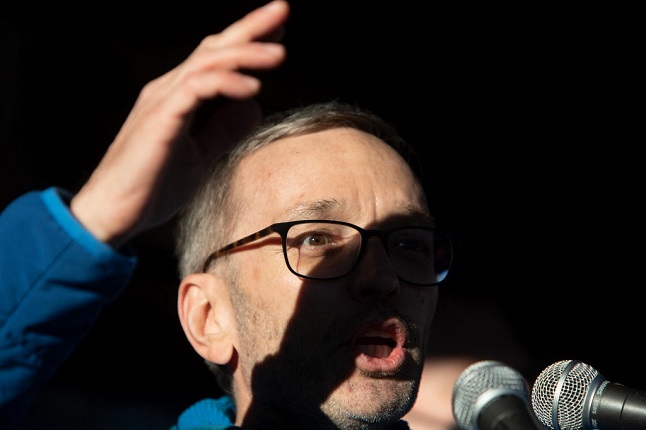On Sunday September 25th, the Freedom Party Austria (FPÖ) came second in the Tyrolean state elections. On the same day, the far right Brothers of Italy party won the national election in neighbouring Italy.
The Brothers of Italy win marks the first time a far right party has been elected into power in Italy since World War II. And in Austria, although the FPÖ didn’t win the Tyrolean vote, their gain came at a loss for the Greens – a typically popular party in Tyrol’s capital, Innsbruck.
This has worried some political commentators, even though the governing Austrian People’s Party (ÖVP) in Tyrol has vowed not to form a coalition with the FPÖ.
So is the FPÖ actually a far right party? And if so, why?
READ ALSO: Five of the biggest challenges facing Austria right now
What is a far right party?
Right-wing politics typically supports traditional values or returning things to how they were in the past, reports the UK’s Evening Standard.
But the definition of a far right party can vary and even be split into two camps.
For some, the term refers to fascist or neo-Nazi political parties, which are authoritarian, ultra-nationalist, and normally openly racist, misogynistic and homophobic.
The far right can also include other parties that sit to the right of a country’s established centre-right. Examples in Europe include France’s National Rally, UKIP in the UK, Alternativ für Deutschland in Germany or the Danish People’s Party.
Cas Mudde, the influential Dutch politics professor and author of The Far Right Today, says the far right is split into two subgroups – the “extreme right” and the “radical right”.
Mudde argues that the “extreme right” rejects the essence of democracy (such as popular sovereignty and majority rule). Whereas the “radical right” accepts the democratic system but is opposed to fundamental elements of liberal democracy, such as minority rights, the rule of law and the separation of powers.
FOR MEMBERS: QUIZ: Would you pass the Austrian citizenship politics and history test?
What is the background of the FPÖ?
The FPÖ was founded in 1956 as a “Germanic national liberal party with close associations to the Nazis”, and the party’s first two chairmen (Anton Reinthaller and Friedrich Peter) were former SS officers, reports Deutsche Welle.
The party started out as far right before moving towards the centre in the following decades. But in 1986 it moved back towards the far right and adopted an anti-elite, populist political stance.
The FPÖ first entered the Austrian Federal Government in 2000 after then-FPÖ leader Jörg Haider (son of Austrian Nazi Party members) formed a coalition government with the ÖVP.
This was the first time a party with Nazi origins became part of a European government since the end of the Second World War. It caused outrage across Europe – even resulting in EU sanctions.
Haider then stepped down as head of the FPÖ in February 2000 but the party remained in the federal coalition until 2006.
After leaving the FPÖ, Haider went on to form another party, the Alliance for the Future of Austria (BZÖ), but he died in a car crash just 13 days after the 2008 elections.
In 2017, the FPÖ once again entered into a coalition government with the ÖVP, and FPÖ leader Heinz Christian-Strache (of Ibizagate fame – more on that below) became the Vice-Chancellor of Austria.
Once again though, the coalition would be short-lived.
READ MORE: ‘I feel ripped off’: What it’s really like living in Austria right now
What is the recent controversy surrounding the FPÖ in Austria?
The FPÖ’s Strache had a spectacular fall from grace in 2019 in an episode that became known as “Ibizagate”.
The scandal can be traced back to a meeting in 2017 on the Spanish resort island of Ibiza between Strache (who was then leader of the FPÖ) and a woman posing as the niece of a Russian oligarch.
Strache was filmed promising the woman state contracts in exchange for helping his party to campaign for elections on an anti-migration, anti-Islam plank.
Strache also discussed the possibility of the woman buying Austria’s most-read tabloid, Kronen Zeitung, and making its editorial line more pro-FPÖ.
He did not know the meeting was a sting and that he was being filmed.
The video surfaced in German media in May 2019 and led to the collapse of the FPÖ-ÖVP coalition government. As well as marked the beginning of the end of former Chancellor Sebastian Kurz’s political career.
Strache was later convicted of corruption and given a 15-month suspended jail sentence. In July 2022, Strache was acquitted on further corruption charges.
BACKGROUND: ‘Ibizagate’: What you need to know about the Austrian political corruption scandal
Does the FPÖ have fascist elements?
An article in Time describes fascism as “a movement that promotes the idea of a forcibly monolithic, regimented nation under the control of an autocratic ruler”.
A quick online search about the FPÖ mostly brings up descriptions including right-wing, populist and national conservative. But there are some alarming stories too.
For example, in 2019, the party published a poem in the town of Braunau (where Adolf Hitler was born), which warned against cultural mixing in Austria and compared immigrants to rats.
An Austrian study also found that the profile of FPÖ voters has hardly changed over the years, stating: “The FPÖ performs above average among men, younger people, workers and people with a lower level of education.”
FOR MEMBERS: Austrian presidential elections: What exactly does the president do?
What are the FPÖ’s far right policies?
The FPÖ official website states (in English): “We are committed to Austria’s right to self-determination and to preserving and protecting our view of mankind and society that has matured in our traditions and in our history.”
“Freedom” is listed as the first priority in the party’s policies. In second place is “protecting our homeland of Austria, our national identity and autonomy”.
The party manifesto also states: “Austria is not a country of immigration. This is why we pursue a family policy centred around births.”
Other FPÖ policies focus on a free constitutional state, a market economy, social justice and Austria’s right to self-determination.
The FPÖ has also been a fierce opponent of Covid-19 restrictions in Austria and appeared at many protests that took place, especially in Vienna.
So are they far right?
Yes, the FPÖ fits the profile of a far right political party.
When considering Mudde’s definitions of “extreme right” and “far right”, the FPÖ falls in the latter category.
However, the party was founded on some elements of “extreme right”, and there have been glimpses of that ideology in recent years.



 Please whitelist us to continue reading.
Please whitelist us to continue reading.
Member comments